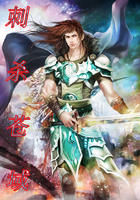Delivered to the Students of the Royal Academy on the Distribution of the Prizes, December 10, 1771, by the President.
Gentlemen,--The value and rank of every art is in proportion to the mental labour employed in it, or the mental pleasure produced by it.As this principle is observed or neglected, our profession becomes either a liberal art or a mechanical trade.In the hands of one man it makes the highest pretensions, as it is addressed to the noblest faculties, In those of another it is reduced to a mere matter of ornament, and the painter has but the humble province of furnishing our apartments with elegance.
This exertion of mind, which is the only circumstance that truly ennobles our art, makes the great distinction between the Roman and Venetian schools.I have formerly observed that perfect form is produced by leaving out particularities, and retaining only general ideas.I shall now endeavour to show that this principle, which I have proved to be metaphysically just, extends itself to every part of the art; that it gives what is called the grand style to invention, to composition, to expression, and even to colouring and drapery.
Invention in painting does not imply the invention of the subject, for that is commonly supplied by the poet or historian.With respect to the choice, no subject can be proper that is not generally interesting.It ought to be either some eminent instance of heroic action or heroic suffering.There must be something either in the action or in the object in which men are universally concerned, and which powerfully strikes upon the public sympathy.
Strictly speaking, indeed, no subject can be of universal, hardly can it be of general concern: but there are events and characters so popularly known in those countries where our art is in request, that they may be considered as sufficiently general for all our purposes.Such are the great events of Greek and Roman fable and history, which early education and the usual course of reading have made familiar and interesting to all Europe, without being degraded by the vulgarism of ordinary life in anycountry.Such, too, are the capital subjects of Scripture history, which, besides their general notoriety, become venerable by their connection with our religion.
As it is required that the subject selected should be a general one, it is no less necessary that it should be kept unembarrassed with whatever may any way serve to divide the attention of the spectator.Whenever a story is related, every man forms a picture in his mind of the action and the expression of the persons employed.The power of representing this mental picture in canvas is what we call invention in a painter.And as in the conception of this ideal picture the mind does not enter into the minute peculiarities of the dress, furniture, or scene of action, so when the painter comes to represent it he contrives those little necessary concomitant circumstances in such a manner that they shall strike the spectator no more than they did himself in his first conception of the story.
I am very ready to allow that some circumstances of minuteness and particularity frequently tend to give an air of truth to a piece, and to interest the spectator in an extraordinary manner.Such circumstances, therefore, cannot wholly be rejected; but if there be anything in the art which requires peculiar nicety of discernment, it is the disposition of these minute circumstantial parts which, according to the judgment employed in the choice, become so useful to truth or so injurious to grandeur.
However, the usual and most dangerous error is on the side of minuteness, and, therefore, I think caution most necessary where most have failed.The general idea constitutes real excellence.All smaller things, however perfect in their way, are to be sacrificed without mercy to the greater.The painter will not inquire what things may be admitted without much censure.He will not think it enough to show that they may be there; he will show that they must be there, that their absence would render his picture maimed and defective.
Thus, though to the principal group a second or third be added, and a second and third mass of light, care must be yet taken that these subordinate actions and lights, neither each in particular, nor all together, come into any degree of competition with the principal; they should make a part of that whole which would be imperfect without them.To everypart of painting this rule may be applied.Even in portraits, the grace and, we may add, the likeness, consists more in taking the general air than in observing the effect similitude of every feature.
Thus figures must have a ground whereon to stand; they must be clothed, there must be a background, there must be light and shadow; but none of these ought to appear to have taken up any part of the artist's attention.They should be so managed as not even to catch that of the spectator.We know well enough, when we analyse a piece, the difficulty and the subtlety with which an artist adjusts the background, drapery, and masses of light; we know that a considerable part of the grace and effect of his picture depends upon them; but this art is so much concealed, even to a judicious eye, that no remains of any of these subordinate parts occur to memory when the picture is not present.
The great end of the art is to strike the imagination.The painter is, therefore, to make no ostentation of the means by which this is done; the spectator is only to feel the result in his bosom.An inferior artist is unwilling that any part of his industry should be lost upon the spectator.He takes as much pains to discover, as the greater artist does to conceal, the marks of his subordinate assiduity.In works of the lower kind everything appears studied and encumbered; it is all boastful art and open affectation.The ignorant often part from such pictures with wonder in their mouths, and indifference in their hearts.















